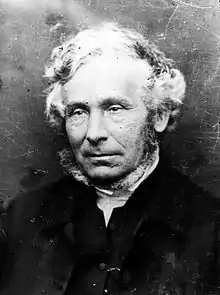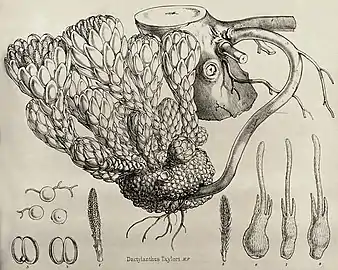Richard Taylor (missionary)
Richard Taylor FGS (21 March 1805 – 10 October 1873)[1] was a Church Missionary Society (CMS) missionary in New Zealand. He was born on 21 March 1805 at Letwell, Yorkshire, England, one of four children of Richard Taylor and his wife, Catherine Spencer.[1]
Richard Taylor | |
|---|---|
 The Reverend Richard Taylor | |
| Born | 21 March 1805 |
| Died | 10 October 1873 (aged 68) |
| Nationality | British |
| Occupation | Missionary |
| Spouse | Mary Catherine Fox (married 1829) |
He attended Queens' College, Cambridge and after graduating BA in 1828, he was ordained as a priest on 8 November 1829.[1] In 1835, he was conferred MA and appointed a missionary in New Zealand for the CMS.[1]
Church Missionary Society
He was present at the signing of the Treaty of Waitangi on 6 February 1840. In 1840 he was appointed as head of the school at Te Waimate mission,[2] then in 1842 posted to the CMS mission station at Whanganui.[3][4] By 1844 the brick church built by the Revd John Mason was inadequate to meet the needs of the congregation and it had been damaged in an earthquake. A new church was built under the supervision of the Revd Richard Taylor with the timber supplied by each pā on the river in proportion to its size and number of Christians.[5] His travels as a missionary extended into the Taranaki and Taupō regions to the north of Whanganui.[6] In March 1846 he hosted Governor George Grey when he visited Whanganui.[7]
In 1848, Taylor wrote A Leaf from the Natural History of New Zealand (1848).[8]
In 1849 he travelled back to Whanganui via Taupō from meeting of CMS missionaries in Tauranga.[9] His missionary travels include travelling up the Whanganui River to settlements such as Pipiriki[10] and to Lake Rotoaira at the base of Mount Tongariro.[11][12] He named settlements along the Whanganui River Ātene (Athens), Koriniti (Corinth), Hiruhārama (Jerusalem) and Rānana (London)[13] and the Wanganui suburb of Taylorville is named after him.[14]
After his death on 19 October 1873, his son, the Revd Basil Kirke Taylor, took over the Whanganui mission.[15]
He wrote numerous books about the natural and cultural environment of New Zealand in his time.[14]
Gallery
.jpg.webp)
.jpg.webp) Plate 1 of Te Ika a Maui.
Plate 1 of Te Ika a Maui. Dactylanthus taylorii named after its discoverer, Richard Taylor.
Dactylanthus taylorii named after its discoverer, Richard Taylor._-_Sarjeant_Gallery.jpg.webp) The Rev Richard Taylor with Hoani Wiremu Hīpango and family walking by the third Putiki Mission church.
The Rev Richard Taylor with Hoani Wiremu Hīpango and family walking by the third Putiki Mission church.
Artist: George Sherriff
Works
- Taylor, Richard (1848). A Leaf from the Natural History of New Zealand. Wellington: Robert Stokes.
- Taylor, Richard (1855). Te Ika a Maui, or New Zealand and its Inhabitants. London: Wertheim and Macintosh.
- Taylor, Richard (1868). The Past and Present of New Zealand; With Its Prospects for the Future. London: William Macintosh.
Further reading
- Chapple, L. J. B.; Barton, Cranleigh (1930). Early Days in Whanganui (1840–1850). Wanganui: H. I. Jones & Son Limited.
- Macgregor, Miriam Florence (1975). Petticoat Pioneers: North Island Women of the Colonial Era. Vol. 2. Wellington: Reed. ISBN 0589011340.
- Mead, A. D. (1966). Richard Taylor: Missionary Tramper. Wellington: A. H. & A. W. Reed.
- Owens, J. M. R. (2004). The Mediator: A Life of Richard Taylor 1805–1873. Wellington: Victoria University Press.
- Ross, Janet E. (February 1965). The Missionary Work of the Rev. Richard Taylor at Wanganui (MA). Victoria University of Wellington.
- Smith, Howard Ulph; Robertson (née Taylor), Sylvia Edith (3 December 2011). "The Rev. Richard TAYLOR". The Descendants of William TAYLOR circa 1628. Retrieved 23 March 2022.
- Springer, Randal, ed. (1993). The Missionary's Daughter: Early Days at the Putiki Mission and Wanganui from Diaries of Laura Taylor. Wanganui: Whanganui Historical Society Inc. ISBN 0473019442.
References
- Owens, J. M. R. (1990). "Taylor, Richard". Dictionary of New Zealand Biography. Te Ara: The Encyclopedia of New Zealand. Retrieved 29 January 2019.
- Bedggood, W.E. (1971). Brief History of St John Baptist Church Te Waimate. News, Kaikohe.
- Rogers, Lawrence M. (1973). Te Wiremu: A Biography of Henry Williams. Pegasus Press.
- "The Church Missionary Gleaner, July 1843". Progress of the Gospel in the Western District of New Zealand – The Death of Rev J Mason. Adam Matthew Digital. Retrieved 12 October 2015.
- "The Church Missionary Gleaner, June 1845". Erection of Places of Worship in New Zealand. Adam Matthew Digital. Retrieved 13 October 2015.
- "The Church Missionary Gleaner, September 1845". Anxiety of New Zealanders for Instruction. Adam Matthew Digital. Retrieved 16 October 2015.
- "The Church Missionary Gleaner, November 1847". Visit of the Governor of New Zealand to Wanganui. Adam Matthew Digital. Retrieved 16 October 2015.
- Taylor, Richard (1848). A Leaf from the Natural History of New Zealand. New Zealand Electronic Texts Collection.
- "The Church Missionary Gleaner, August 1850". The Old Chief Tumuwakairia. Adam Matthew Digital. Retrieved 17 October 2015.
- "The Church Missionary Gleaner, December 1847". Administration of the Lord's Supper at Pipiriki, New Zealand. Adam Matthew Digital. Retrieved 16 October 2015.
- "The Church Missionary Gleaner, June 1853". The Cave at Okura, New Zealand. Adam Matthew Digital. Retrieved 18 October 2015.
- "The Church Missionary Gleaner, August 1853". Manihera, and His Murderer, Huiatahi. Adam Matthew Digital. Retrieved 18 October 2015.
- Diana Beaglehole (February 2010). "Whanganui places – River settlements". Te Ara –the Encyclopedia of New Zealand.
- Foster, Bernard John (1966). McLintock, Alexander Hare (ed.). "Taylor, Richard". Dictionary of New Zealand Biography. Te Ara: The Encyclopedia of New Zealand. Retrieved 29 January 2019.
- "The Church Missionary Gleaner, April 1874". The Late Rev. R. Taylor. Adam Matthew Digital. Retrieved 24 October 2015.